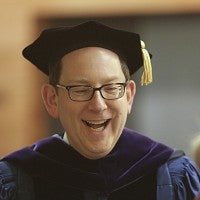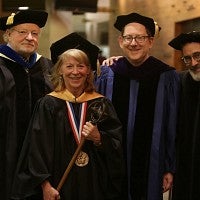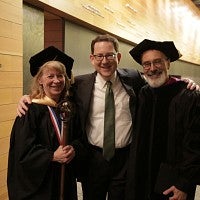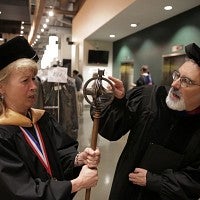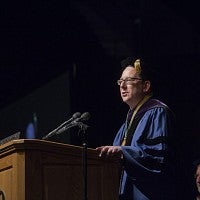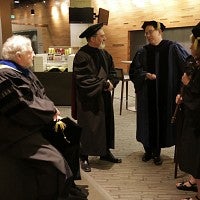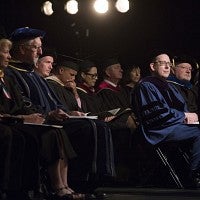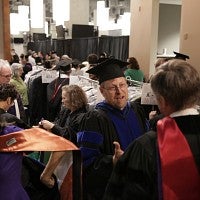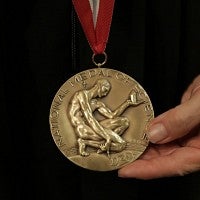The University of Oregon stands at the cusp of a brighter future, UO President Michael Schill declared Wednesday, but it must confront, and quell, a set of false myths about the worth of public higher education if it is to advance its position as a great university.
At his investiture as the UO’s 18th president, Schill laid out his vision for the university as he stood among family, friends and colleagues to formally receive the university mace and medallion. In his remarks, he urged the audience to help counter emerging notions questioning the value and affordability of a college degree, the importance of both research and philanthropy and the utility of a degree in the humanities or social sciences.
The president said this is the time to stand up for the idea that higher education opens the door to a better life and that a world-class university, as the UO aspires to be, will make Oregon and the nation better and stronger.
“We must reject the myths of public higher education’s demise and make our bright future a reality,” Schill said. “Oregon deserves a great university. I am committed to working with each of you to make the University of Oregon a great university, a better university, the very best university that it can be.”
RELATED LINKS
Schill’s reflections came after he led a procession of faculty members in full academic regalia into Matthew Knight Arena for the traditional ceremony marking the installation of a new president. The procession was led by chemistry professor Geri Richmond, the UO Presidential Chair in Science and recent recipient of the National Medal of Science.
Also joining Schill on the platform were Columbia University professor and former Provost Jonathan Cole, U.S. Rep. Peter DeFazio, Oregon Attorney General Ellen Rosenblum, members of the president’s family and many dignitaries from the UO, Oregon and beyond. UO Board of Trustees Chair Chuck Lillis presented Schill with the president’s medallion and university mace, the official symbols of leadership at the UO.
UCLA Chancellor Gene Block was scheduled to take part in the investiture and a higher education symposium that took place earlier in the day, but he had to leave suddenly after receiving reports of a fatal shooting on the UCLA campus. A moment of silence was held during the investiture to reflect on the tragedy.
An East Coast native, Schill spoke of his immersion into all things Oregon, remarking that in spite of the lessons he still grapples with sports lingo. He also alluded to the university’s recent turnover in leadership and said it neither dissuaded him from accepting the position, nor does it mean he will follow in those footsteps.
“In the last year, I’ve grown to love Oregon,” he said. “I’ve been inspired by the university’s past, I've grappled with the current challenges and come to the clear conclusion that the future is very bright for the University of Oregon. I am energized and I'm excited by the road ahead, and I don’t plan on going anywhere.”
After almost a year on the job, Schill said he has a clearer view of the future — or of the possible future — of the UO. The university, he said, is once again at a crossroads; it has the ingredients for success in an excellent faculty and staff, amazing students and an independent board of trustees, but it must overcome the misconceptions that are leading too many people to question the value and role of a public university degree.
“These myths, they prevent our students from opening the doors to a lifetime of opportunity. These myths, they distract policy makers and divert resources. These myths, they curb creative exploration and choke discovery. These myths, they discourage our faculty and frustrate our alumni,” the president said.
“If we buy into these myths, we shortchange our students, our state and our nation, and, if left unchecked, one day we are going to wake up and these myths are going to be a reality. This is not acceptable. We must challenge these misconceptions — head on — for the sake of our institution and for the future of higher education. The University of Oregon cannot truly be great unless it unshackles itself from these burdens.”
In particular, Schill said the UO must counter any notion that the people of Oregon are not interested in having a nationally prominent flagship university. He said that isn’t what he’s hearing from the UO’s friends and supporters or from community and state leaders, but he said the university must be vigilant to ensure that the public at large sees the value in what the UO is working to achieve.
“The myth that we don’t want excellence should raise the ire of all those who love this beautiful university and who care about this exceptional state,” he said. “…Pursuing excellence is how the University of Oregon will crush these myths that hamper student access, that stunt teaching and creativity, that limit our capacity for discovery and economic impact.”
Schill defended and lauded the role of philanthropy in helping the university advance and balancing the state’s disinvestment in higher education. And he pushed back against the notion that students should concentrate on learning job skills at the expense of a broad, liberal arts education.
He also dismissed the contention that research should take a back seat to teaching. And even as he pledged to raise the UO’s profile in the natural sciences, he championed the importance of both the humanities and social sciences, saying the idea that these subjects are no longer valuable “is not just a myth; it's a blasphemy.”
“The University of Oregon is and will remain deeply committed to the liberal arts,” he said. “…We will keep a commitment to the humanities even as we invest in a more prominent footprint in the sciences.”
Invoking the words of both the late UO President Dave Frohnmayer and track legend Steve Prefontaine, Schill said he alone cannot bring about the future the UO deserves. He called on the entire university community to join in the task of building the university’s reputation and ensuring it makes a difference in the community, the state, the nation and the world.
“The University of Oregon needs all of us to give nothing less than our best. This is how we will fulfill the ambitions of those who have come before us,” he said. “…We must invest in faculty and research. We must fulfill our public mission of accessibility, diversity and economic mobility. We must fuel the economy of the state, and contribute to our world through our discoveries and the students we enlighten.”
—By Greg Bolt, University Communications


